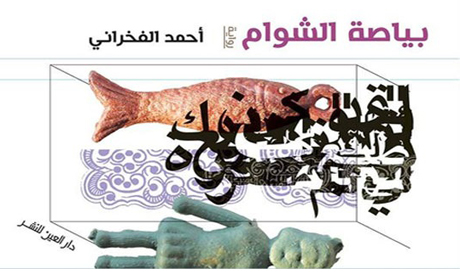
Bayaset El-Shawam by: Ahmed El Fakharani
Bayaset El-Shawam (“Syrian Square”) by Ahmed El Fakharani, Al-Ein Publishing House, 2019.
In his fourth novel, Ahmed El Fakharani has decided to make the main character, Saeed, the legend, the creator, the problem, the prophet and the answer to the existential questions that pass through everyone’s mind. Why are we here? What happened in the past? What will happen in the future? What is the truth of this world? What is our role in it? How can we escape death? What is the answer to our problems? Better yet, where are the answers to our eternal questions?
The writer has chosen the name of a small district in Alexandria, Bayaset El-Shawam, or the Syrian Square, as the title of his novel. He has invented a magical world, closed and guarded, as a small laboratory for the realm.
The word bayasa is very particular to Alexandria. It comes from the Italian word “piazza,” meaning public square, and has been transformed by an Arabic accent. The word is part of the collective memory of cosmopolitan Alexandria that has been disappearing for the last couple of decades. Attempts at reviving this identity have been made by artists and writers in their work, with the title of this novel just one example.
The main landmark within this dreamlike neighbourhood is a well-known, real world, restaurant, Quail King. In the novel, it charges high prices and provides strange rituals and deals with the devil: men get eternal youth and virility, women eternal beauty and the power of seduction. In reality, both get rid of their sins with even greater sins.
The novel starts with the suicide of the main character’s mother. Mentally unstable, she is shouted at by her exasperated son, leading her to jump to her death. This incident triggers all the events of the novel and the existential questions.
Saeed is a sculptor who creates statues that he thinks are ugly; yet Bamboo sees the statue that he made for his lover Soraya (which she disliked and kicked him out of bed for making it) as a masterpiece, and in the boss’s point of view it is alive.
The guard or the boss of the bayasa, Bamboo, reveals to Saeed that Idris, his master, used to make statues that contained the spirit of the person they resembled, and asked him to make a statue that eternalised him and his victory over the Upper Egyptian families that used to control Bayaset El-Shawam before him. When Saeed tells him that the master did not reveal the secrets of the trade to his assistant, Bamboo does not believe him and pushes him to make the desired statue.
The erotic scenes in the novel can be described as sophisticated. They channel the passion of a young man discovering love in a physical way with an experienced woman, Soraya, a woman who represents all women, with their beauty, intelligence, sins and hold over men.
The novelist also uses a strange technique in the narration. The main character, Saeed, talks to Bamboo; then, they become one person, change roles and eventually one takes over the scene and continues. The reader accepts and enjoys that writing style and it becomes a signature for the writer and the novel.
The novel is a good read, and is able to sustain interest until the final page. The plot is uncovered and the answers are found with the last phrase of the novel.
In general, people do not like to be told what to do or what to think, and the novelist has avoided being direct in his philosophy. Yet his messages are clear and reach the reader directly. There are no simple answers to the eternal questions, yet summing up all the questions and trying to pave a road to the answers is a courageous and noble cause.
Short link: